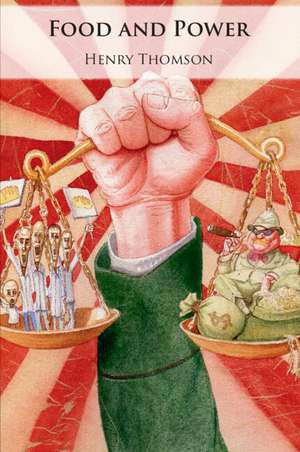Food and Power: Regime Type, Agricultural Policy, and Political Stability
Autor Henry Thomsonen Limba Engleză Paperback – 9 noi 2022
| Toate formatele și edițiile | Preț | Express |
|---|---|---|
| Paperback (1) | 222.71 lei 6-8 săpt. | |
| Cambridge University Press – 9 noi 2022 | 222.71 lei 6-8 săpt. | |
| Hardback (1) | 691.66 lei 3-5 săpt. | |
| Cambridge University Press – 5 iun 2019 | 691.66 lei 3-5 săpt. |
Preț: 222.71 lei
Nou
Puncte Express: 334
Preț estimativ în valută:
42.61€ • 44.61$ • 35.26£
42.61€ • 44.61$ • 35.26£
Carte tipărită la comandă
Livrare economică 05-19 aprilie
Preluare comenzi: 021 569.72.76
Specificații
ISBN-13: 9781108701594
ISBN-10: 1108701590
Pagini: 251
Ilustrații: 30 b/w illus. 25 tables
Dimensiuni: 152 x 229 x 14 mm
Greutate: 0.37 kg
Editura: Cambridge University Press
Colecția Cambridge University Press
Locul publicării:New York, United States
ISBN-10: 1108701590
Pagini: 251
Ilustrații: 30 b/w illus. 25 tables
Dimensiuni: 152 x 229 x 14 mm
Greutate: 0.37 kg
Editura: Cambridge University Press
Colecția Cambridge University Press
Locul publicării:New York, United States
Cuprins
1. Introduction; 2. Policy, institutions and stability; 3. Policy outcomes; 4. Food, policy and unrest; 5. Agricultural rents and regime durability; 6. Germany, 1878–1890; 7. Malaysia, 1969–1980; 8. Conclusion.
Recenzii
'For anyone who thinks they know how authoritarian regimes manage the political dilemma of promoting economic development while sustaining regime stability; you don't, until you have read this book. Using the best of social science - cross-national data, contemporary cases, and careful historical case studies - we see that economic development is a deeply political process with profound political reverberations. A modern work but in the great tradition of Alexander Gerschenkron's Bread and Democracy, Henry's Thomson places food and agriculture at the center of the study of regime change. He emerges full of illuminating insight for scholars of present-day authoritarianism and democracy.' Daniel Ziblatt, Eaton Professor of the Science of Government, Harvard University
'Food and Power reminds us of the fundamental tension between cities and countryside over food prices in the course of economic development. Advancing an argument familiar to scholars of African politics, Thomson writes that authoritarian regimes tend to depress food prices to placate hungry consumers in the cities, and that this comes at the expense of small-scale farmers who are difficult to organize politically. Democracy, he contends, produces pro-farmer policy. In this argument, rural social structure and development matter, too, adding important new dimensions to the debate. Food and Power opens questions that are ripe for reanalysis in studies of the political economy of development.' Catherine Boone, London School of Economics and Political Science
'Conflict between rural agricultural producers and urban food consumers is central to understanding development policy, protest, and regime durability around the world. In this timely and carefully argued book, Henry Thomson shows how regimes use agricultural policy to protect their rule - and how this logic of agricultural policymaking differs between democracies and dictatorships. Food and Power draws together insights on urban protest, inequality, and political regimes to develop a novel account of the politics of agricultural policy that is truly global in scope.' Thomas Pepinsky, Cornell University
'To conclude, Food and Power impresses with its massive amount of empirical evidence and highly detailed approach to analysis. Its argument is both eminently reasonable and, at times, intriguingly counterintuitive. It was a pleasure to read and should be of considerable interest to scholars of authoritarianism and political economy of development.' Brian Palmer-Rubin, Governance
'Food and Power reminds us of the fundamental tension between cities and countryside over food prices in the course of economic development. Advancing an argument familiar to scholars of African politics, Thomson writes that authoritarian regimes tend to depress food prices to placate hungry consumers in the cities, and that this comes at the expense of small-scale farmers who are difficult to organize politically. Democracy, he contends, produces pro-farmer policy. In this argument, rural social structure and development matter, too, adding important new dimensions to the debate. Food and Power opens questions that are ripe for reanalysis in studies of the political economy of development.' Catherine Boone, London School of Economics and Political Science
'Conflict between rural agricultural producers and urban food consumers is central to understanding development policy, protest, and regime durability around the world. In this timely and carefully argued book, Henry Thomson shows how regimes use agricultural policy to protect their rule - and how this logic of agricultural policymaking differs between democracies and dictatorships. Food and Power draws together insights on urban protest, inequality, and political regimes to develop a novel account of the politics of agricultural policy that is truly global in scope.' Thomas Pepinsky, Cornell University
'To conclude, Food and Power impresses with its massive amount of empirical evidence and highly detailed approach to analysis. Its argument is both eminently reasonable and, at times, intriguingly counterintuitive. It was a pleasure to read and should be of considerable interest to scholars of authoritarianism and political economy of development.' Brian Palmer-Rubin, Governance
Notă biografică
Descriere
Explains how economic development leads to democracy by exploring how authoritarian governments manipulate the agricultural sector.
